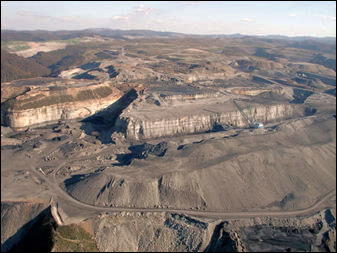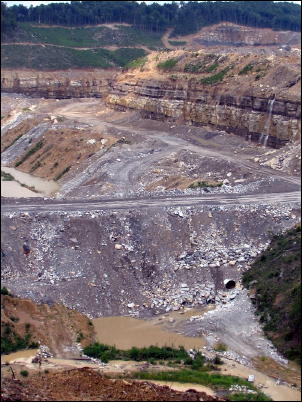GOV. MANCHIN SAYS OBAMA KILLING COAL JOBS - Massey Was Fined $2.4 Billion For Pollution

Mountaintop removal site in southern West Virginia
Governor Joe Manchin has announced he is going on the warpath to save mountaintop mining.
Manchin says he is now clear that President Obama's EPA wants to do away with the mining process that calls for the rapid destruction of the state's mountains, pushing billions of tons of waste into state's waters and polluting the streams.
Manchin has good reason to be upset.
State government is primarily driven by taxes from the coal industry and other extractors. The gambling industry has also become a big revenue generator.
Manchin said this week, the U.S. Environmental Protection Agencies decision to more closely review mining permits in four states is "cruel and inhumane."
The EPA referred 79 pending mining permits, including 23 in West Virginia, to its water quality experts and the U.S. Army Corps of Engineers for more scrutiny.
Manchin said, "I don't believe they have the right to do that...I believe the EPA has stepped over its boundaries."
Mountaintop removal is a quick and easy way to remove coal, requiring tens of thousands fewer workers than underground mining.
The EPA says the 79 permits need more review under the federal Clean Water Act because they raise "potentially significant water quality and environmental issues."

Mountaintop removal site in southern West Virginia
The permits would allow mine operators to bury intermittent streams with excess material removed to expose coal seams.
Environmental groups including the Sierra Club and the Rainforest Action Committee want Obama to ban the practice, arguing it destroys ancient mountain peaks, fouls water and damages the culture of Appalachia.
"People all over West Virginia can't believe this is happening," West Virginia Coal Association President Bill Raney said in a statement. "They don't understand why Washington is willing to kill-off good paying jobs when our economy is still on the ropes and the unemployment rate is still unacceptably high."
Environmentalists remind West Virginians that the coal industry abandoned hundreds of strip mines. The federal government, over thirty years later, is allocating taxpayer money for partial clean-up.
Massey Energy, a company with a lengthy record of environmental abuses and proponent of mountaintop removal, was faceing fines worth an estimated two-point-four billion dollars from a lawsuit alleging it violated the federal Clean Water Act.
The violations happened thousands of times in both West Virginia and Kentucky.
Massey says the vast majority of the incidents had little or no impact on water quality, and decline to oay the fines. Later, Massey paid up, a s=much smaller amount in a settlement deal.